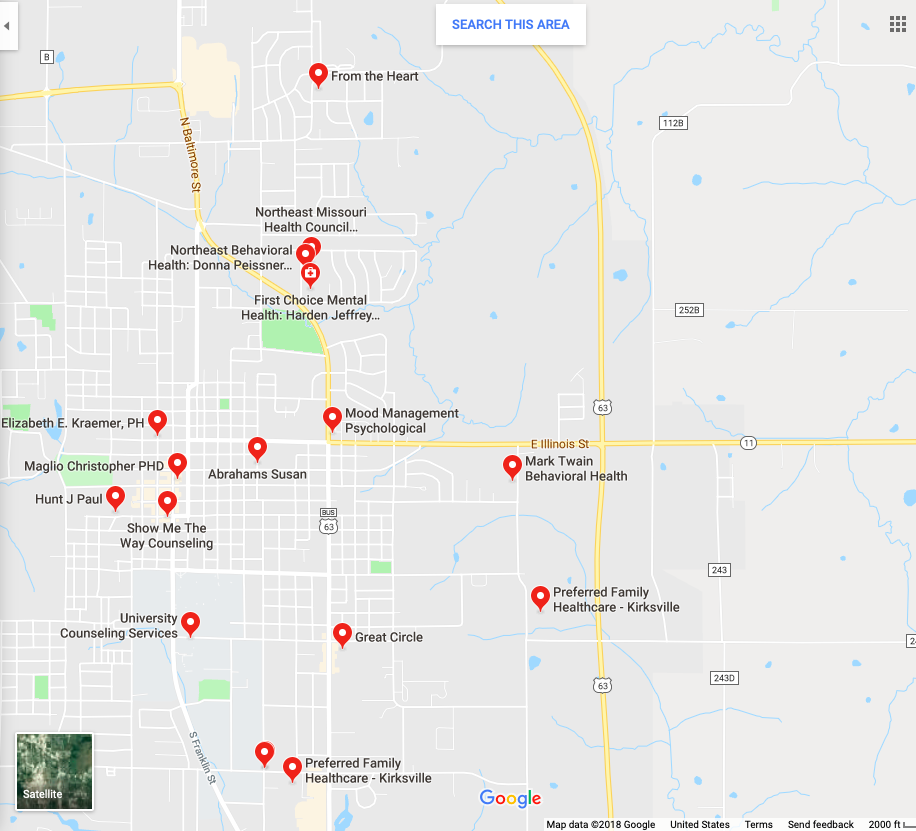Mission
Our mission is to investigate the correlation between income and appropriate access to treatment for mental health needs in Kirksville, Missouri. Appropriate access to mental health treatment is vital for a citizen to become a self-sufficient and an active member of the local community. We are going to explore the opportunities currently available for Kirksville and surrounding Adair County residents, of all ages and stages of life.
Mental Health Services located in Kirksville:
According to Google Maps, we have indicated local providers of mental health services in the Kirksville community. We have compiled a list of these providers linked to more online information regarding services. Phone numbers have been provided in the absence of a related website.
- Mark Twain Behavioral Health
- Preferred Family Healthcare
- Maxwell Counseling Services (660) 342-3222
- First Choice Mental Health
- Show Me the Way Counseling (660) 988-3992
- Northeast Family Health
- Still Specialty Clinic (660) 665-0202
- Truman State University Student Health Center and Counseling Services
- Mood Management Psychological (660) 665-3664
- Hunt J Paul, Psychologist (660) 626-2777
- Maglio Christopher PHD, Psychologist (660) 665-7805
- Abrahams Susan, Family Counselor (660) 665-2779
- Great Circle Mental Health Service
- Cindy Mayberry Apn LLC
- Green Hills Clinic (660) 627-1222
- Elizabeth E Kraemer, PH, Psychologist (660) 665-1964
- From the Heart, Family Counseling (660) 665-6862
Data Collection
Interview With Brenda Niemeyer
Brenda Niemeyer is a counselor at Kirksville High School. Mrs. Niemeyer splits the number of students with another counselor employed at the school. Serving students with last names A-K, she takes care of roughly 400 students. There are four program components that are implemented through counseling services: counseling curriculum, individual student planning, responsive services, and system support.
Brenda expressed that in the previous year, there was a growing need for mental health care in her school. In result, the school partnered with Preferred Family Healthcare, a local behavioral health non-profit organization. Through this pairing, Preferred employed two part-time counselors to be at the school and available to the students. If a student does not have the means to pay for the services, they are not billed.
When we asked Brenda if she believes there was a correlation between access to mental health and financial needs, she expressed there was, but that the needs were met. Her thoughts were that although this community is small and does not have much resources compared to larger communities, the issues are met in different ways. Churches may hire counselors to serve their bodies, schools may pair with mental health providers, or countless other ways small-town communities adapt to having limited resources.
Interview with Christine Steele, Department of Social Services – Children’s Division
Christine Steele is a specialist working for the state of Missouri’s Department of Social Services – Children’s Division for the northern region of Missouri. Having a master’s in social work and 17 years of experience in her department, Ms. Steele was apt to provide an analysis on her perspective of mental health in the context of families and children in Kirksville as it relates to the network of services and processes that occur both privately and through government institutions to support the community.
Ms. Steele emphasized the importance of her job in weaving together support networks for at risk families and children. She expressed that mental health can be a complicating factor for family instability that is not always apparent or exists as one issue among many. The extent of involving the courts depends on the severity of the case at hand and the protective services needed for a child that sometimes requires court ordered services. Oftentimes, Ms. Steele helps in providing cohesive information about the services available to families regarding mental health in the area as preemptive work before the development of adverse effects that would require legal intervention. The agency’s ultimate goal is to provide access to services in order to maintain the family unit in a healthy, supported environment.
However, there are barriers that exist to families and children getting access to meaningful mental health treatment. Ms. Steele discussed the need for finding services in metropolitan areas when unavailable locally, such as psychiatric evaluations and acute hospitalizations. The distance between services and those in need strains people’s access in terms of finances, insurance, and transportation. However, relative to the rest of the Northeastern region, Kirksville acts as a metropolitan hub, often accommodating for the lack of services in neighboring communities. When asked about the changes that have occurred through her work over time, Ms. Steele assessed a growing demand for mental health treatment and less stigma and resistance in accepting those services.
Reggie Westhoff – Nurse Practitioner at Mark Twain Behavioral Health Center
Mrs. Westhoff is an experienced mental health nurse practitioner employed at Mark Twain Behavioral Health Center in Kirksville, MO. She discussed the struggles of treatments and quality of mental health care in small town Missouri. She expressed the importance of being regularly treated, especially when the client doesn’t always recognize the importance of treatment, and doesn’t always attend appointments and counseling sessions, which is a significant problem in those who are recently or in denial of being diagnosed with mental disorder.
Regarding local providers and services offered, the demand for not only the service provided for clients, but the demand for mental health professionals who can provide those services for clients. Professionals have wait-lists so long that they are unable to efficiently treat, medicate, and counsel those who are in need. She expressed that she has tried to resign more than once from Mark Twain to transfer to a provider closer to home, however she has been rehired not once, but two times because they are unable to find a professional to take her place. Similar situations have occurred to others in regional providers, because mental health professionals difficult to find due to the frustrations of the mental health field.
Mrs. Westhoff is also frustrated with the funding for the mental health community. She said that both the federal and state government allows for the the mental health funding to be cut rather easily, especially when budget cuts are being implemented. Because the funding is so low, the services and aid that the providers are able to accommodate are even more limited.
Conclusion
Through our research, we found that although mental health resources may be more reasonably accessed when a person has adequate insurance and transportation, there are many ways that low income individuals are supported in the community to overcome potential barriers to meaningful mental health treatment. A common theme throughout the interviews we conducted was a growing demand for mental health treatment in the community and the inability of local resources to completely fulfill the needs of Kirksville residents. Although these needs are not fully met, such as a lack of psychiatric services and acute hospitalization, Kirksville serves as a hub for mental healthcare in the Northeastern region of Missouri. This small-town and surrounding rural areas need to continue assessing and adapting to the needs of the community. As mental healthcare needs are continuing to grow, access to appropriate care needs to follow with appropriate accommodations for low income families and individuals.

